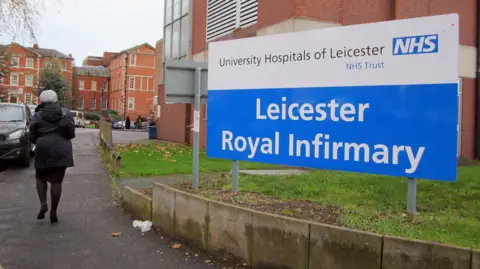Care failures led to woman's death, inquest finds
 Lime Solicitors
Lime SolicitorsA grandmother died after complications from a routine procedure were made worse by failures in her medical care, an inquest has found.
Bridget Stewart, 58, died at Leicester Royal Infirmary on 29 February 2024, after more than two years of serious health issues that followed a gynaecological procedure.
An inquest at Leicester Coroner's Court concluded her death was caused by recognised complications from the procedure, worsened by poor management of her blood-thinning medication.
Assistant coroner Dianne Hocking said there were failures to correctly stop, restart and monitor the medication, which contributed to Ms Stewart's death.
She returned a narrative conclusion at the final day of the hearing on 10 July.
University Hospitals of Leicester NHS Trust (UHL), which runs the hospital, said it had "learned from this case" and since "made significant improvements" to its processes.
 PA Media
PA MediaMs Stewart first went to her GP in September 2021, complaining of prolonged and irregular menstrual bleeding.
She had a hysteroscopy later that year when tests suggested possible abnormalities in her uterus, said Lime Solicitors, which has been supporting the family.
Two weeks after the procedure, she was admitted to hospital with symptoms of severe sepsis.
Over the following months, she developed further serious complications, including bowel ischaemia - a condition where blood flow to the intestines is reduced.
This led to emergency surgery when part of her colon was removed and a stoma was created.
Her family said this had a major impact on her quality of life, causing ongoing pain, repeated infections, and difficulties with mobility and independence, said Lime Solicitors.
In February 2024, she was scheduled for reconstructive surgery to improve her condition but it was subsequently cancelled three days before it was due to happen.
'Heartbreaking'
Concerns were raised during the inquest about how her blood-thinning medications were managed during this period.
The coroner said there was a failure to consult haematology specialists, despite the complexity of her case.
As a result, Ms Stewart developed clotting in the arteries supplying her legs and surgeons were forced to amputate her right leg above the knee, but her condition rapidly worsened and she died shortly afterwards.
Ms Stewart's daughter, Amy Jarvis, said the family had been left devastated.
"It is heartbreaking to think how much my mum suffered for more than two-and-a-half years following what should have been a routine procedure," she said.
"She was a strong, intelligent woman who placed her trust in the professionals caring for her. Instead, she was let down repeatedly and we had to watch her health unravel bit by bit."
'Improve patient safety'
According to Lime Solicitors, the coroner also raised concerns about the use of two separate electronic systems at the hospital, which risked important medical information being lost or overlooked.
A letter of concern will be sent to the hospital trust encouraging improvements to be made, the law firm said.
Andrew Furlong, medical director at the UHL, said: "On behalf of the trust, I would like to express my heartfelt condolences to the family of Bridget Stewart.
"We acknowledge the coroner's findings and would like to assure Bridget's family that we have learned from this case and made significant improvements to our processes, including providing extensive training on anticoagulation management to all colleagues on our wards."
Medical negligence solicitor Maryam Abdullah, who supported the family ahead of the inquest, said the case highlighted "missed steps" in Ms Stewart's care.
She said: "The delays and inconsistent application of critical medication protocols contributed directly to her deteriorating health and, ultimately, her death.
"We are working closely with Ms Stewart's family to pursue a civil claim. We hope the coroner's findings will serve as a catalyst for healthcare providers to rigorously review and improve their protocols to prevent similar failings in the future and improve patient safety."
Follow BBC Leicester on Facebook, on X, or on Instagram. Send your story ideas to [email protected] or via WhatsApp on 0808 100 2210.
